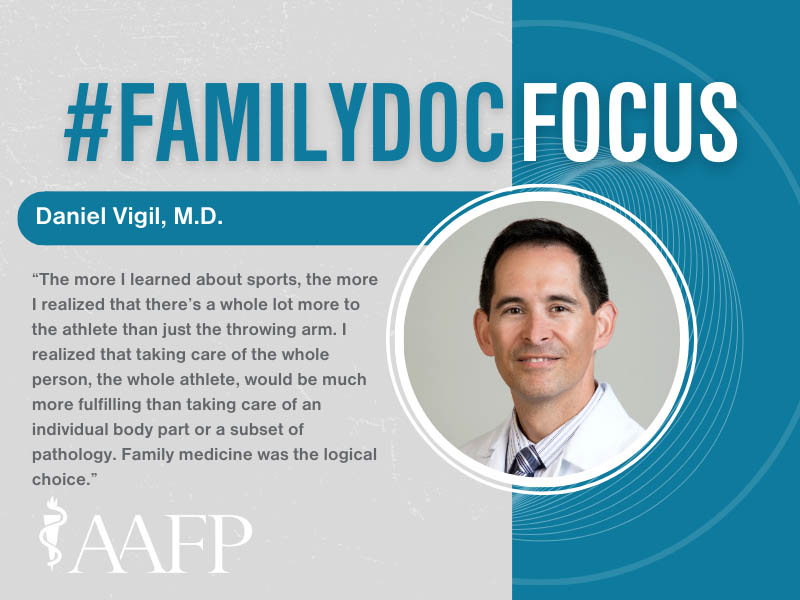Olympics a Golden Opportunity for Sports Medicine Doc
Aug. 28, 2024, David Mitchell — Daniel Vigil, M.D., was a sprinter during his undergraduate studies at Stanford, but his lasting impact on athletics has taken place not on a track, field, diamond or court, but rather in the care he provides for athletes behind the scenes.

“I wanted to be a sports medicine team physician from the earliest time,” he said. “As a freshman in high school, I thought, ‘Wow, this injury of mine is a bummer. Not only do I want to get better, but it would be pretty cool to take care of athletes in the future.”
Vigil is doing just that in roles as the associate head team physician for University of California, Los Angeles, athletics and the associate head team physician and director of primary care for both the Los Angeles Lakers and the Los Angeles Chargers. His travels with USA Track and Field and USA Basketball have taken him around the world with stops in Brazil, Croatia, Germany, Morrocco, the Philippines and Spain.
He recently returned from Paris, where UCLA physicians served as team doctors for the men’s and women’s USA Basketball squads at the Summer Olympics.
“It was simultaneously exciting, unique, stressful and a once-in-a-lifetime event,” he said of his first Olympic Games. “It was truly overwhelming in a very positive way.”
There won’t be much time to relish the experience. UCLA is entering its first season with the Chargers, who already have played three preseason football games and officially kick off the NFL season Sept. 8.
Vigil attended Harvard Medical School, which lacks a family medicine department, and originally dreamed of being a surgeon who could operate on the hands or arms of injured quarterbacks and pitchers. He spent an internship year in general surgery at Cedars-Sinai Medical Center in Los Angeles, but later chose a path to sports medicine through primary care, by matching with the family medicine residency at Kaiser Permanente Medical Center in Los Angeles.
“The more I learned about sports, the more I realized that there’s a whole lot more to the athlete than just the throwing arm,” said Vigil, a UCLA health sciences associate clinical professor of family medicine and orthopaedic surgery who serves as chief of the Divisions of Primary Care Sports Medicine in both departments. “I realized that taking care of the whole person, the whole athlete, would be much more fulfilling than taking care of an individual body part or a subset of pathology. Family medicine was the logical choice. There was this burgeoning field of primary care sports medicine right around the time I was choosing residency and applying to fellowship.”
Vigil completed a primary care sports medicine fellowship at UCLA, working with the Bruins’ women’s water polo and soccer teams.
More on Sports Medicine
Marcia Faustin, M.D., FAAFP, associate team physician for University of California, Davis, athletics and co-head team physician for the USA Gymnastics women’s national team, will be the guest on the Inside Family Medicine podcast in September.
“They were phenomenally talented teams,” said Vigil, who also is medical director for the UCLA Health Sports Performance Center. “Watching talented, successful athletes in any sport is always inspiring but also challenging. These are athletes who, when they get sick and injured, expect a lot. When you’re 19 or 20 years old, you expect miracles. But we know no doctor can provide that. During fellowship, I learned to refine my style and bedside manner so I could convey to patients what’s realistic, what’s doable and what’s practical, given their overall goals and objectives.”
Vigil said his experience as a competitive runner helps him communicate with patients during the process of diagnosis, treatment, recovery and return to sport.
“The more a doctor can relate to patients, the better the connection, understanding and compassion,” said Vigil, who still runs 10 to 20 miles a week. “If you’ve been an injured athlete and now you’re a sports medicine physician, knowing what that patient is going through is helpful. I’ve had my share of pulled muscles, tendinitis and other things that afflict runners.”
Vigil and his primary care sports medicine colleagues see patients, both athletes and non-athletes, in UCLA Health clinics. But they also treat athletes wherever they are needed, including locker rooms, training room and sidelines.
“That’s a skill that should never be taken for granted,” he said. “It’s hard practicing medicine on a sideline, dealing with crowd noise, teammates, officials, parents and coaches while you’re trying to focus on an injury or an illness. It’s the practice of medicine in an unusual environment that takes a special skill and proper training.”
Vigil said he enjoyed other aspects of family medicine but loves his niche in sports medicine.
“Family doctors are really talented physicians who are able to apply our craft across virtually every segment of human society, and that’s pretty cool,” Vigil said. “If you choose to refine that and go into women’s health, adolescent medicine, sports medicine or addiction medicine — something that emphasizes a specific aspect of family medicine — good for you. Follow your dreams, and you’ll find your passion. If it means sacrificing a little bit, or a lot, of the overall scope of family medicine, I think that’s OK, and I’ve come to grips with that. I used to deliver babies, and I miss that, but I’ve become really good at this one thing I’ve chosen to do. You have to make choices. If you choose to maintain the full scope of family medicine, good for you, too.”